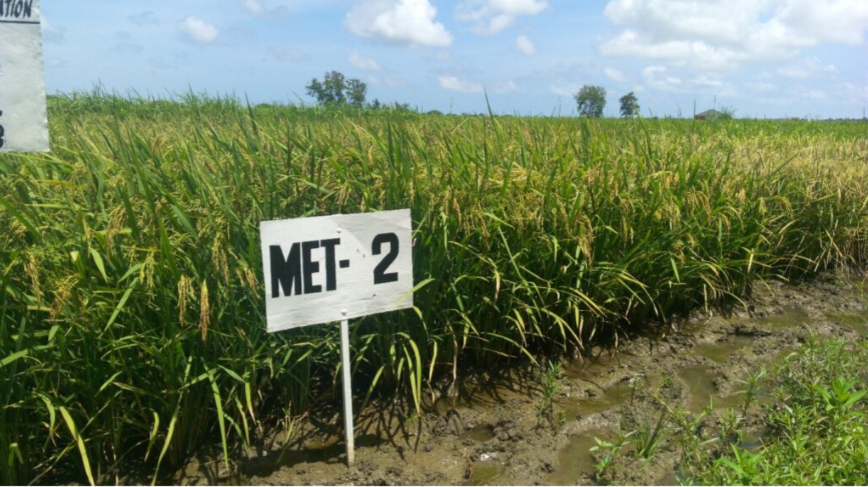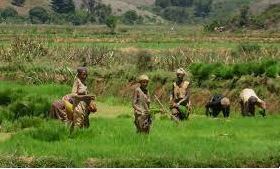System of Krain Krain Cultivation in Sierra Leone
Conventional cultivation of krain krain — a popular green leafy vegetable (Corchorus) — starts with the broadcasting of seeds randomly on raised beds (mounds) or on flat land with high seed density (direct seeding), with manure added from backyard compost or FYM. Harvesting the crop is by uprooting the whole plant, so it is done […]
System of crop intensification for more productive, resource-conserving, climate-resilient, and sustainable agriculture: experience with diverse crops in varying agroecologies
During the latter half of the twentieth century, most efforts to increase food production were based on apotheosis was dubbed the green revolution, has raised the output of food, but with substantial and growing financial and environmental costs, and for some years it has been encountering diminishing agronomic and economic returns (Peng et al., 2010; […]
Intensification and semi-intensification of tef production in Ethiopia: applications of the system of crop intensification
Future strategies for sustainable food security will need to get greater productivity from available land, labour, water and other resources, producing more food, as much as possible, with reduced inputs. The System of Crop Intensification (SCI) which emerged from an agroecological production strategy developed for rice in Madagascar in the 1980s has shown promise in […]
To What Extent Do Improved Practices Increase Productivity of Small-Scale Rice Cultivation in A Rain-fed Area? : Evidence from Tanzania
The training was called SRI (System of Rice Intensification) and main
contents of the training included the adoption of modern varieties (MV), chemical
fertilizer use, and straight-raw dibbling or transplanting with the spacing of 25cm by
25cm.
BURKINA FASO: Publireportage – Projet ECDD – Soutenir l’Agriculture Familiale Face au Changement Climatique
Video: La plaine rizicole de Karfiguéla s’est transformée grâce au projet « Eau, CLÉ du Développement Durable » (ECDD). Autrefois désespérée en raison du changement climatique et de pratiques agricoles inefficaces, cette région prospère à nouveau. Le projet ECDD a expérimenté avec succès des pratiques agroécologiques sur une superficie de 500 m². Des agriculteurs témoignent […]
Agricultural Advances at COP28: Grounds for Optimism Amidst the Overlooked Urgency for Emissions Reduction in Agriculture
How did COP28 address agriculture and climate change? The headline outcome of COP28 was the agreement to phase down fossil fuel usage – a significant step forward in global climate policy. Equally noteworthy, however, was the attention given to sustainable agriculture’s role in climate change mitigation and the need for its adaptation to a changing […]
Exploring the Impact of Alternate Wetting and Drying and the System of Rice Intensification on Greenhouse Gas Emissions: A Review of Rice Cultivation Practices
A new article in Agronomy shows that there doesn’t need to be a trade-off between food security and climate change mitigation. A review of field studies found that SRI is associated with both reduced GHG emissions and higher yield compared with conventional flooded rice farming. The authors, James Dahlgreen and Adam Parr, found that the mean reduction […]
The System of Rice Intensification (SRI) Contributions to Agricultural Sustainability-II
The system of rice intensification, developed some four decades ago in Madagascar, started receiving international attention only after 2002. As SRI methods have repeatedly been found to evoke more productive and robust rice phenotypes from given genotypes, its use has spread, and the methodology has now been validated in >60 countries. During this process, the […]
LE COUPLAGE DE L’APPROCHE SMART-VALLEYS ET SRI
Le Smart-valleys est une approche de dévelop- pement de bas-fonds pour des systèmes de pro- duction rizicole en Afrique sub-saharienne, ba- sée sur une démarche participative, durable et à faible coût. Elle a été développée par le Centre du riz pour l’Afrique (AfricaRice) et ses partenaires de recherche, en 1997 et 2001 au Ghana et […]
Tanzania Agricultural Research Institute
Rice farmers have expressed their satisfaction with the project of System of Rice Intensification (SRI) in Tanzania that withstands the effects of climate change, which reduces production costs while productivity doubles that of conventional agriculture. This was stated during the SRI Stakeholders Annual workshop held in Mbeya Region on January 24 through 27 at the […]
Enhancing food security in developing countries
Enhancing food security in developing countries The Matial Environmental Trial (MET -2) rice variety is resistant to drought and high levels of salt in the soil, offering farmers a new breed that can produce optimally in the face of worsening effects of climate change on agriculture. The variety’s needle-like leaves also protect the rice from […]
Competition des pratiques rizicoles et avantages de la technique du SRI pendant la saison culturale VARY BE
A Madagascar, 78,7 % de la population sont agricoles dont 83,7 % pratiquent l’agriculture à titre d’activité principale (INSTAT, Campagne 2004-2005), de plus la part de l’agriculture dans le PIB total est de 28 % (FAO, 2008). Le développement de l’agriculture est alors un des facteurs clés pour dynamiser le pays. Concernant la riziculture, elle […]










